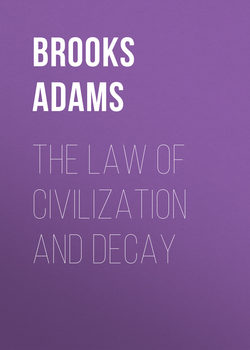The Law of Civilization and Decay

Реклама. ООО «ЛитРес», ИНН: 7719571260.
Оглавление
Adams Brooks. The Law of Civilization and Decay
PREFACE
CHAPTER I. THE ROMANS
CHAPTER II. THE MIDDLE AGE
CHAPTER III. THE FIRST CRUSADE
CHAPTER IV. THE SECOND CRUSADE
CHAPTER V. THE FALL OF CONSTANTINOPLE
CHAPTER VI. THE SUPPRESSION OF THE TEMPLE
CHAPTER VII. THE ENGLISH REFORMATION
CHAPTER VIII. THE SUPPRESSION OF THE CONVENTS
CHAPTER IX. THE EVICTION OF THE YEOMEN
CHAPTER X. SPAIN AND INDIA
CHAPTER XI. MODERN CENTRALIZATION
CHAPTER XII. CONCLUSION
Отрывок из книги
When the Romans first emerged from the mist of fable, they were already a race of land-owners who held their property in severalty, and, as the right of alienation was established, the formation of relatively large estates had begun. The ordinary family, however, held, perhaps, twelve acres, and, as the land was arable, and the staple grain, it supported a dense rural population. The husbandmen who tilled this land were of the martial type, and, probably for that reason, though supremely gifted as administrators and soldiers, were ill-fitted to endure the strain of the unrestricted economic competition of a centralized society. Consequently their conquests had hardly consolidated before decay set in, a decay whose causes may be traced back until they are lost in the dawn of history.
The Latins had little economic versatility; they lacked the instinct of the Greeks for commerce, or of the Syrians and Hindoos for manufactures. They were essentially land-owners, and, when endowed with the acquisitive faculty, usurers. The latter early developed into a distinct species, at once more subtle of intellect and more tenacious of life than the farmers, and on the disparity between these two types of men, the fate of all subsequent civilization has hinged. At a remote antiquity Roman society divided into creditors and debtors; as it consolidated, the power of the former increased, thus intensifying the pressure on the weak, until, when centralization culminated under the Cæsars, reproduction slackened, disintegration set in, and, after some centuries of decline, the Middle Ages began.
.....
Unquestionably Diocletian must have lived a life of intense activity at the focus of affairs, to have raised himself from slavery to the purple at thirty-nine; and yet Gibbon thought he did not even visit Rome until he went thither to celebrate his triumph, after he had been twenty years upon the throne. He never seemed anxious about the temper of the city. When proclaimed emperor he ignored Italy and established himself at Nicomedia on the Propontis, where he lived until he abdicated in 305. His personal preferences evidently did not influence him, since his successors imitated his policy; and everything points to the conclusion that he, and those who followed him, only yielded to the same resistless force which fixed the economic capital of the world upon the Bosphorus. In the case of Constantine the operation of this force was conspicuous, for it was not only powerful enough to overcome the habit of a lifetime, but to cause him to undertake the gigantic task of building Constantinople.
Constantine was proclaimed in Britain in 306, when only thirty-two. Six years later he defeated Maxentius, and then governed the West alone until his war with Licinius, whom he captured in 323 and afterward put to death. Thus, at fifty, he returned to the East, after an absence of nearly twenty years, and his first act was to choose Byzantium as his capital, a city nearly opposite Nicomedia.
.....